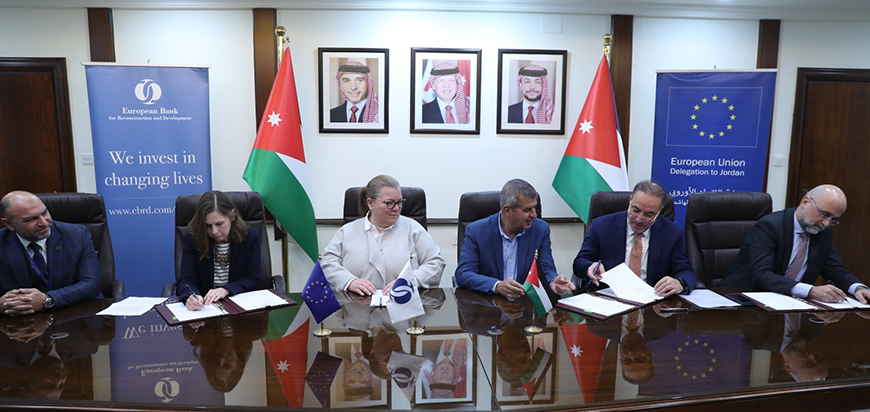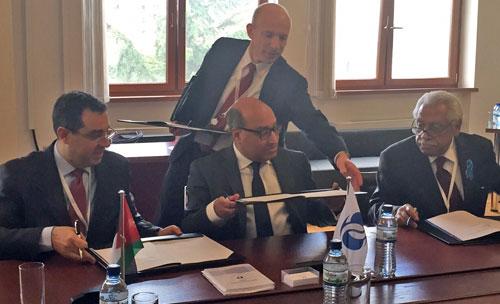You are here
EU supports projects to turn waste into electricity, use solar power to operate water pumping stations
By Mohammad Ghazal - Dec 07,2016 - Last updated at Dec 07,2016
AMMAN — EU-supported projects were announced Wednesday to help Jordan turn food waste into electricity and use sunshine to operate several major water pumping stations.
The EU and the European Bank for Reconstruction and Development (EBRD) have joined efforts with Jordan to extend the use of sustainable and innovative renewable energy technology by providing finance, grants and technical cooperation for two projects in the solid waste management and water supply sectors.
With a 30-million-euro grant from the EU, the Water Authority of Jordan will install photovoltaic systems to power three to five water pumping stations across the country. The EBRD will manage the grant funds and supervise the implementation of the project.
“Today’s support is part of our commitment to supporting Jordan in the renewable energy sector, which is a very promising sector in the country,” EU Ambassador to Jordan Andrea Matteo Fontana said at a ceremony to sign the grant agreements.
Installing solar systems at the pumping stations is crucial as some 40 per cent of water authorities’ expenses go to electricity bills, he said.
The project will save Jordan around JD5 million annually once the systems are operational, Iyad Dahiyat, the secretary general of the Ministry of Water and Irrigation, said at the ceremony.
According to the official, 15 per cent of the electricity generated in Jordan is consumed by the water sector, pushing its annual energy bill to around JD150 million.
“The five water pumping stations where the systems will be installed represent around 80 per cent of the overall electricity consumption in the water sector,” Dahiyat said.
The total capacity of the solar-powered system will be 20-25 megawatts (MW), according to Fontana, who said that several more EU-supported projects in the field of energy and renewable energy in Jordan are in the pipeline.
In addition, the EBRD is extending a loan of up to 7.5 million euros to the Greater Amman Municipality (GAM), while the EU Delegation in Jordan is contributing 5 million euros in grants to help build a waste-to-energy plant in Al Shaer solid waste transfer station.
The plant is expected to produce up to 9 million cubic metres of biogas per year from food waste, recycling approximately 11 per cent of the organic waste collected.
The plant’s yearly capacity for energy generation, estimated at up to 25,000MW, would be enough to power 8,000 Jordanian households.
The population growth in Amman has placed an unprecedented burden on the solid waste management services provided by the GAM, and such services have already been strained, officials have said.
In recent years, Al Shaer waste transfer station, the only operational station serving the capital, has seen a 40 per cent increase in the solid waste it processes, and the plant currently operates at a level greatly exceeding its design capacity, GAM officials said, adding that the project will help ease the burden placed on this facility.
Stressing the importance of the grants, Heike Harmgart, the head of the EBRD resident office in Jordan, said the renewable energy sector in Jordan is commercially viable.
The bank’s investments in Jordan’s energy sector have reached $500 million, of which 75 per cent are in renewable energy.
Harmgart added that the two projects, for which agreements were signed Wednesday, are expected to be operational within two-and-a-half years.
“The EBRD is committed to helping Jordan upgrade its municipal infrastructure services to improve the daily lives of Jordanians and refugee communities alike,” she said.
“The bank promotes the adoption of renewable technology for a more sustainable use of scarce resources. This work can become a model for other projects in the Jordanian municipal sector,” Harmgart noted.
Related Articles
The European Bank for Reconstruction and Development (EBRD) is providing a $13 million loan to the Greater Amman Municipality to help manage solid waste, generate electricity and reduce carbon dioxide emissions, it said in a statement.
The European Bank for Reconstruction and Development (EBRD) announced in a press statement on Tuesday that it is helping to address Jordan’s acute energy shortage with an investment that will increase the efficiency of energy consumption in the country’s water sector.


















